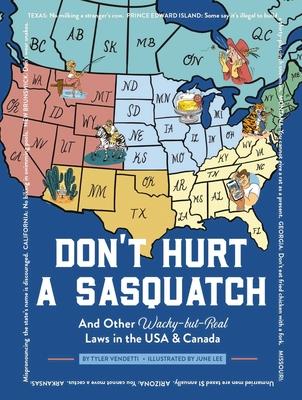This hilarious compendium dives into the quirkiest decrees from around the country, from Alabama's ban on driving blindfolded to Delaware's restriction on selling dog hair.
Every state in the country has its own set of rules, carefully designed to identify the biggest problems in its culture and correct them. Most of them are normal: don't steal, don't kill, don't go somewhere you don't belong, etc. All it takes is one weirdo to throw a wrench in that ordinary list, one unruly dude who tried to hold a salmon suspiciously or wash an alligator in a bathtub for lawmakers to step in and impose some order. What are some of these crazy laws, you ask? Take your pick:
- In Connecticut, it's illegal for a barber to hum a tune while clipping your hair.
- Thinking about buying a boat house? Think again. It's considered illegal in the state of Georgia to live on a boat for longer than a month.
- Pigeons get the short end of the stick in both San Francisco, California and Venice, Italy: it's against the law to feed them in public in both cities.
- Ready to say I do! a third time? Hopefully, you don't live in Kentucky: women are not allowed to marry thrice in the Southern state.
- Want to surprise your loved one with a pizza? Too bad. Sending a pie to someone without their permission can result in a $500 dollar fine in Louisiana.
- In Arizona, you can't feed garbage to a pig without a permit. What constitutes as garbage, though, is up to you.
The list goes on. More interesting than the laws themselves are the histories behind each, which Blue Laws goes into in detail. Like, why can't you roll a boulder in Boulder, Colorado? Who decided that you couldn't catch fish with your hands in Indiana? Why are blue laws called blue laws and how did they come to mean generally weird rules (instead of their original meaning: laws dictating what citizens can and cannot do on Sundays)? In this informative and funny book, you will find out through a series of anecdotes, court cases, and illustrated pictures that break down just how and why these rules (most of which are still currently in effect) came to be. Good for history teachers, trivia nerds, or white elephant gift exchange participants, Don't Hurt a Sasquatch is a widely appealing book that will teach you more about how the world works than you ever wanted to know.
